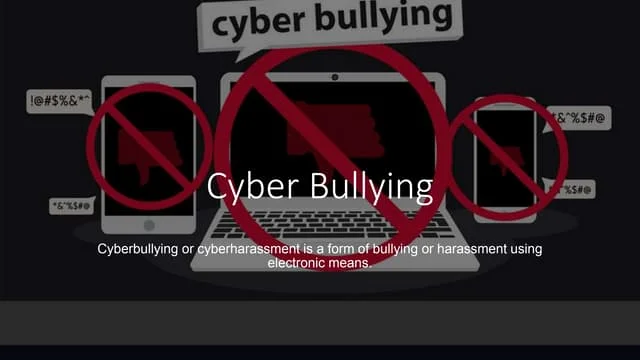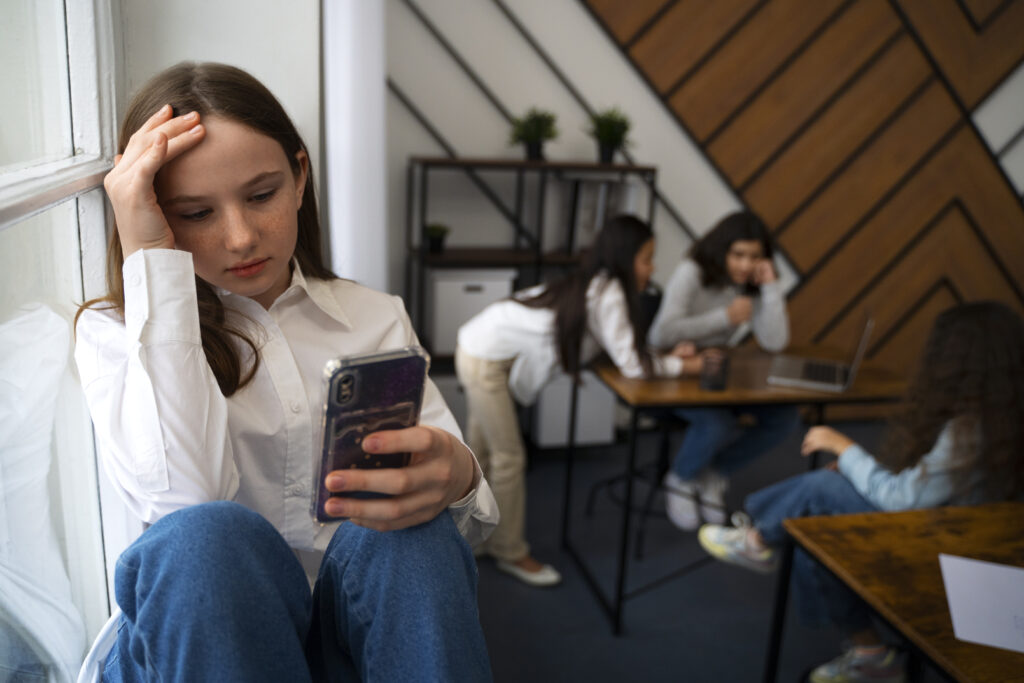
Let’s talk about something important today: cyberbullying. It’s a big word, but it’s something that can affect kids of all ages. As parents, teachers, and anyone who cares about kids, it’s good to understand cyberbullying and its impact on children’s mental health and well-being.
Here in the USA, so many kids are online these days, texting, chatting, and sharing on social media. It’s a great way to connect with friends and family, but sometimes, things can take a turn for the worse. That’s where cyberbullying comes in.
Also Read: 10 Essential Survival Skills to Make You a Master of Your Environment
What is Cyberbullying?
Imagine a bully on the playground, teasing or leaving someone out. Now, imagine that same kind of behavior happening online. That’s cyberbullying. It’s when someone uses technology to be mean or hurtful to another person. Here are some ways cyberbullying can happen:

- Sending mean text messages or emails
- Posting embarrassing pictures or videos of someone online without their permission
- Leaving nasty comments on social media posts
- Excluding someone from online groups or chats
- Spreading rumors about someone online
Why is Cyberbullying a Big Deal?
Cyberbullying might seem harmless at first, like kids just messing around. But it can actually have a very serious impact on a child’s mental health. Here’s why:
- It can feel never-ending. Unlike a bully on the playground, cyberbullying can follow a kid everywhere they go online. There’s no escape!
- It can be anonymous. Bullies online can hide behind usernames and fake profiles, making it harder to track them down and stop them.
- It can feel like everyone is watching. With social media, anything posted online can be seen by a lot of people, making it feel even more embarrassing for the victim.
How Can Cyberbullying Affect a Child’s Mental Health?
Cyberbullying can make kids feel sad, lonely, and even scared. It can affect their self-esteem and make them feel like they’re not good enough. Here are some signs that your child might be getting cyberbullied:

- They seem withdrawn or upset after using their phone or computer.
- They’re suddenly secretive about their online activity.
- They become moody or irritable.
- They lose interest in things they used to enjoy.
- They have trouble sleeping or eating.
- They talk about feeling hurt or worthless.
What Can We Do to Help?
If you think your child might be getting cyberbullied, here are some things you can do:
- Talk to them! Let your child know you’re there for them and that you care. Create a safe space for them to open up and tell you what’s going on.
- Keep Calm. Don’t get angry or upset. You want your child to feel comfortable talking to you.
- Help them gather evidence. Save screenshots, emails, or other proof of the bullying.
- Report the bullying. Most social media platforms and schools have ways to report cyberbullying. You can also contact the website or app where the bullying is happening.
- Work with the school. If the bullying is happening with other kids at school, talk to the teacher, principal, or counselor. They can help address the issue and create a safer learning environment.

- Focus on building their self-esteem. Help your child focus on their strengths and positive qualities. Let them know they’re not alone and that you love them.
Sesources that can help:
- StopBullying.gov: https://www.stopbullying.gov/ This website from the U.S. Department of Health and Human Services has tons of information about bullying, including cyberbullying. It has resources for parents, educators, and kids.
- Cyberbullying Research Center: https://cyberbullying.org/ This website has information and resources about cyberbullying, including how to prevent it, respond to it, and get help.
- The National Suicide Prevention Lifeline: 988 If you or someone you know is struggling with thoughts of suicide, please call the National Suicide Prevention Lifeline. They are available 24/7 and can provide support and resources.
Remember, You’re Not Alone!
Cyberbullying is a serious issue, but there are things we can do to help. By talking to our kids, working together with schools and communities, and using the resources available, we can create a safer online environment for everyone.
Empowering Kids to Be Safe and Responsible Online Citizens
Here’s how we can continue the conversation and empower kids to be safe and responsible online citizens:
Open Communication is Key:
- Set Ground Rules: Establish clear expectations for how your child will use their devices and social media accounts. Discuss responsible online behavior, like being kind to others and respecting privacy.
- Regular Check-ins: Make it a habit to casually chat with your child about their online activities. Ask them about the apps they use, the people they interact with, and if they’ve ever encountered anything mean or upsetting.
- Transparency is a Two-Way Street: Be open with your kids about your own online life. Share your experiences and show them how you navigate tricky situations online. This builds trust and encourages them to be open with you too.
Also Read: 7 Effective Strategies For A Digital Detox: A Comprehensive Guide
Equipping Kids with Digital Literacy Skills:
- Understanding Digital Footprints: Explain to your kids that everything they post online leaves a trace. Discuss the importance of being mindful of what they share and how it can impact them in the future.
- Privacy Settings: Walk your child through the privacy settings on their social media accounts and favorite apps. Show them how to control who can see their posts and information.

- Critical Thinking About Online Content: Help your child develop an awareness of online content. Discuss the difference between real and fake news, the dangers of online scams, and how to be critical about what they see online.
Building a Supportive Online Community:
- Positive Role Models: Encourage your child to follow positive influencers and accounts that promote kindness and respect online.
- The Power of Bystanders: Talk to your child about how they can be an upstander online. If they see someone being cyberbullied, they can offer support to the victim, report the bullying, and encourage others to be kind.
- Building Online Communities of Kindness: Help your child find online communities that share their interests and promote positive values. This can be a great way for them to connect with like-minded people and feel supported.
Remember, it’s a journey! Building a safe and healthy online experience for your child takes time and effort. There will be bumps along the road, but by working together, we can empower them to navigate the digital world confidently and responsibly.
Here are some additional resources for parents and educators:
- ConnectSafely: https://connectsafely.org/ – Provides resources on a variety of topics related to online safety for kids and teens.
- Common Sense Media: https://www.commonsensemedia.org/ – Offers age-appropriate reviews of apps, games, movies, and TV shows, helping parents make informed decisions about what their kids are consuming online.
- National PTA: https://www.stopbullying.gov/ – Provides resources and tips for parents on how to talk to their kids about cyberbullying.
Together, let’s create a more positive and inclusive online environment for everyone! ** Important Note:
- If you suspect your child is being cyberbullied, take immediate action. Report the bullying to the appropriate platform or website, and document the evidence. In some cases, it may be necessary to involve law enforcement. Always prioritize your child’s safety and well-being.
FAQs: Cyberbullying and its Impact on Children’s Mental Health
- Isn’t cyberbullying just kids being kids online? Why is it such a big deal?
While it might seem like harmless teasing at first, cyberbullying can have a much deeper impact than traditional bullying. Unlike a bully on the playground, cyberbullying can follow a child everywhere they go online, making it feel never-ending. Additionally, the anonymity online allows bullies to be even meaner and crueler, and the potential for a large audience to see the bullying can be incredibly damaging.
- What are some of the signs that my child might be getting cyberbullied?
Here are some signs to watch out for:
- Changes in mood: They seem withdrawn, upset, or irritable after using their phone or computer.
- Secrecy: They become secretive about their online activity.
- Loss of interest: They lose interest in things they used to enjoy.
- Trouble sleeping or eating: Their sleep or eating patterns change.
- Self-deprecating talk: They talk about feeling hurt, worthless, or like they want to disappear.
- What should I do if I think my child is getting cyberbullied?
- Open Communication: First and foremost, create a safe space for your child to talk to you. Let them know you’re there for them and that you care.
- Gather Evidence: Save screenshots, emails, or other proof of the bullying, with your child’s permission.
- Report the Bullying: Report the bullying to the social media platform, app, or school where it’s happening.
- Work with the School: If the bullying involves other kids at school, talk to the teacher, principal, or counselor.
- Focus on Support: Help your child build their self-esteem and focus on their strengths. Let them know they’re loved and not alone.
- What resources are available to help with cyberbullying?
There are many resources available to help with cyberbullying. Here are a few:
- StopBullying.gov: https://www.stopbullying.gov/
- Cyberbullying Research Center: https://cyberbullying.org/
- The National Suicide Prevention Lifeline: 988
- Isn’t taking away my child’s phone or computer the easiest solution?
While taking away technology might seem like a quick fix, it’s not always the most effective solution. It can isolate your child from their friends and make it harder for them to connect with support systems online. Instead, focus on open communication, setting ground rules for technology use, and teaching them how to navigate the online world safely.
- How can I talk to my child about cyberbullying without scaring them away from the internet?
Focus on having an open and honest conversation. Explain what cyberbullying is and why it’s hurtful. Discuss ways they can stay safe online and encourage them to come to you if they ever experience anything mean or upsetting.
- What can I do to prevent cyberbullying from happening in the first place?
There’s no foolproof way to prevent cyberbullying entirely, but here are some steps you can take:
- Open Communication: Talk to your child about online safety early and often.
- Digital Literacy Skills: Teach them about digital footprints, privacy settings, and critical thinking about online content.
- Positive Online Role Models: Encourage them to follow positive online influences.
- Building a Supportive Online Community: Help them find online communities that promote kindness and positive values.
- What if I’m being cyberbullied as an adult?
Cyberbullying can affect anyone, not just kids. The resources mentioned earlier can still be helpful, and there are also resources specifically for adults experiencing cyberbullying. Here are a few:
- The National Center for Victims of Crime: https://www.victimsofcrime.org/
- The Rape, Abuse & Incest National Network (RAINN): https://www.rainn.org
- Is there anything I can do to help if I see someone else being cyberbullied?
Absolutely! Here are some ways you can be an upstander:
- Offer Support: Reach out to the person being bullied and offer your support.
- Report the Bullying: Report the bullying to the platform or website where it’s happening.
- Speak Up: If you see someone cyberbullying, consider speaking up and calling out the behavior.
- What are some of the long-term effects of cyberbullying on children’s mental health?
Cyberbullying can have a lasting impact on a child’s mental health. Here are some potential long-term effects:
- Depression and Anxiety: Cyberbullying can increase a child’s risk of developing depression and anxiety.
- Low Self-Esteem: The constant negativity and humiliation of cyberbullying can damage a child’s self-esteem and sense of worth.
- Social Isolation: Cyberbullying can make a child feel isolated and withdrawn from friends and family.
- Self-Harm and Suicidal Thoughts: In severe cases, cyberbullying can lead to self-harm or suicidal thoughts. It’s important to take any threats of self-harm seriously and seek professional help immediately.
Remember, if you or someone you know is struggling with cyberbullying or its effects, there is help available. Reach out to a trusted adult, a friend, or a crisis hotline. You are not alone!

